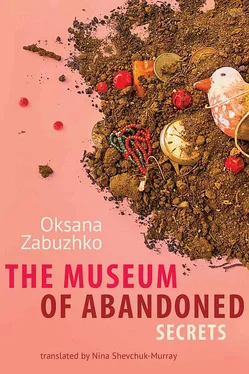Aside from the Finland campaign, this was, no matter how you look at it, Stalin’s only defeat; and, for forty years after he died, the official Soviet history spared no funds or imagination to pay “the West,” as they called it, back. The funding part stopped being a secret for us—the sophisticated kids—in school, when no other topic provoked such heated arguments during the breaks: for our parents, the war was still alive, not something fixed in books, and the families’ accumulated memories diverged way too far from what we were supposed to memorize, resulting in a nearly chemical incompatibility, words and memories bubbling and bursting, finally depositing the textbook in the clear and despised category of “Bullshit!”
And that’s really all that I personally could claim to know—not much. So the whole UIA thing had nothing to do with anything.
I just could not leave the photograph with Artem. It was mine —it had become mine. And not just because I happened to have been thoroughly fucked on top of it without putting up much resistance. Instead, I didn’t resist because at that moment I was possessed by someone else’s will . That’s what it had felt like. (And for the rest of that day I could barely move, as if I’d been run through a meat grinder.)
The young woman who stood with aristocratic ease among four armed men in the middle of the forest and smiled imperceptibly, the woman surrounded by a halo of light, a chimera of photography, had a name—Olena Dovganivna.
And beyond that, I really knew nothing.
* * *
“What are you thinking about?”
“I’m never going to make this film. Never.”
“Of course you will. It’ll all work out,” you say with confidence that scares me.
Your family silently looks out at me out from the photographs, all at once. I can’t believe it. What did you see in me? (A question that must never, under any circumstances, be voiced, so I bite my tongue anyway, just in case—I wouldn’t want you to start thinking about it.)
Something I never told you: When you kissed me that first time (actually, it was I who kissed you first—when I couldn’t stand for another second to be held in your ecstatically adoring gaze that only lacked a pair of hands folded in prayer—of course you were intimidated, with me being a TV star and all), what shook me most, wrung me more cruelly than ever, was the expression I saw on your face when our lips parted: the look of a man who climbed to the top of the mountain, then turned around to look at the valley, and saw the earth swallow the city where he’d come from. You looked at me as if you didn’t recognize me, as if I oscillated and changed shapes every instant, and the flickering of ecstasy and horror on your face mirrored my shape-shifting, and for an instant, before we looked away, I glimpsed through your eyes the ground parting beneath; silently, with the sound on mute, buildings collapsed one after the other, as if filmed from an airplane by an awestruck cameraman.
Since then, the sensation became my own, and every so often I feel its short mournful pang: I am standing at the top of the mountain and you are looking at me, and there’s nowhere for me to go if I wanted to leave.
“You’ll work it all out,” you say, and your certainty sounds unshakeable.
I only now figured out why I felt so ambushed by your Ukrainian when we first met: you move through life with too much confidence. You’re too calm and composed, as if you have not the slightest inkling that one could be otherwise. Among those of us over thirty, who grew up with the constant awareness of our Ukrainian-ness, such natural, unconstrained dignity is rare: composure like yours, even posture like yours, requires three to four generations of ancestors unfamiliar with any kind of internalized social humiliation—not something possible yet in post-twentieth-century Ukraine.
Give me your hand. So hot.
You have wonderful hands; the most beautiful hands I’ve ever seen on a man—strong, finely sculpted, with long, well-bred fingers. Why am I not Rodin, or at least someone in marketing? I’d put your hand on a woman’s knee and hold the shot. Buy Hanes hosiery. This must be the limit of my imagination, the best I can do—commercials.
Don’t let me go, you hear me? I know nothing—I don’t even know if this is what people call love, or if I’m possessed again by someone else’s will. Sometimes I think I am. I don’t know what to want from the future and whether we even have a future. I don’t know anything. Just hold me, okay? Don’t let me go. Just like this.
Room 2. From the Cycle Secrets : Contents of a Purse Found at the Scene of the Accident
Daryna Goshchynska’s Interview with Vladyslava Matusevych
[The scene is picture perfect, as intended: Two women, a blonde and a brunette, are sitting at a café table in the Passage on Khreshchatyk. Both are stylishly dressed and well groomed, both sport bare tan shoulders. It’s the end of August, when everyone returns from summer vacations. In the background, a waiter appears every so often, dressed in a white jacket and wearing the mysterious smile of unspoken understanding that is the trademark of all Kyiv waiters and the reason they all look like low-rank Hindu deities, while the truth is that few of them really know what they’re doing and most are deathly afraid of running into an unusual client—say, someone accompanied by a TV camera that’s currently installed between the tables. One notices the lovely play of light as it filters through the blonde woman’s hair, making it golden and translucent; in fact, it is darker than it appears but streaked with highlights the shade of ripe wheat to give her pale face, with its masculine cleft chin and small birdlike features, a brighter frame, without which it would certainly disappear in a crowd, despite her wide-set eyes. The colors have been chosen perfectly, and no wonder—she’s a painter. In the foreground, more colors contrast with the white of the tablecloth: a glass of dark-ruby wine, a voluminous tankard of Obolon lager with its bridal-veil cap of froth, an ornate pack of Eve Slims—the white-jacketed deity brings an ashtray as big as a soup bowl, but it’s black, better to move it out of the shot, take it off the table altogether, it draws the eye too much.] “Does anyone mind? Okay, this looks good; let’s roll.”
“Vladyslava, we’ve known each other long enough that I can address you in informal terms even in front of the camera—and take great pride in that.” [Both laugh the conspiratorial laugh of women who take pride in their age and are connected by something utterly inaccessible to men, which always inspires a vague unease in the latter.] “First of all, let me congratulate you on your remarkable accomplishment, especially uncommon for a Ukrainian artist—the Nestlé Art Foundation Award for your solo show in, correct me if I’m wrong, Zurich?”
“Zurich, Bern, Geneva, and Lausanne,” lists the blonde. [She has the businesslike intonation of someone long and well used to remarkable accomplishments.]
“You must forgive me; you know what it’s like for Ukrainian journalists: any foreign cultural coverage comes to us secondhand.”
“If not third,” the blonde interjects.
“Exactly!” the interviewer agrees. [She’s a little too eager, and both women laugh again, this time with a tinge of unanimous menace that suggests a history of shared grudges against various things national.] “ There’s nothing we can do about that, so you have to tell your story yourself if you want motherland to be informed.”
“Remember the old Soviet joke,” the blonde says. [She leans over the table, so that her whole upper body faces her interviewer, and she resembles a cat about to leap into a tree. Now the cameraman can appreciate the resolve of her small, sharply featured face with its cleft chin, and he zooms in for a close-up.] “Why is there no meat in the stores?” [The reporter raises her eyebrows in exaggerated curiosity, bursting with a barely contained giggle.] “Because we’re making leaps and bounds toward Communism, and the cattle can’t keep up. It’s the same with artists who gain international recognition—the country can’t keep up.”
Читать дальше












